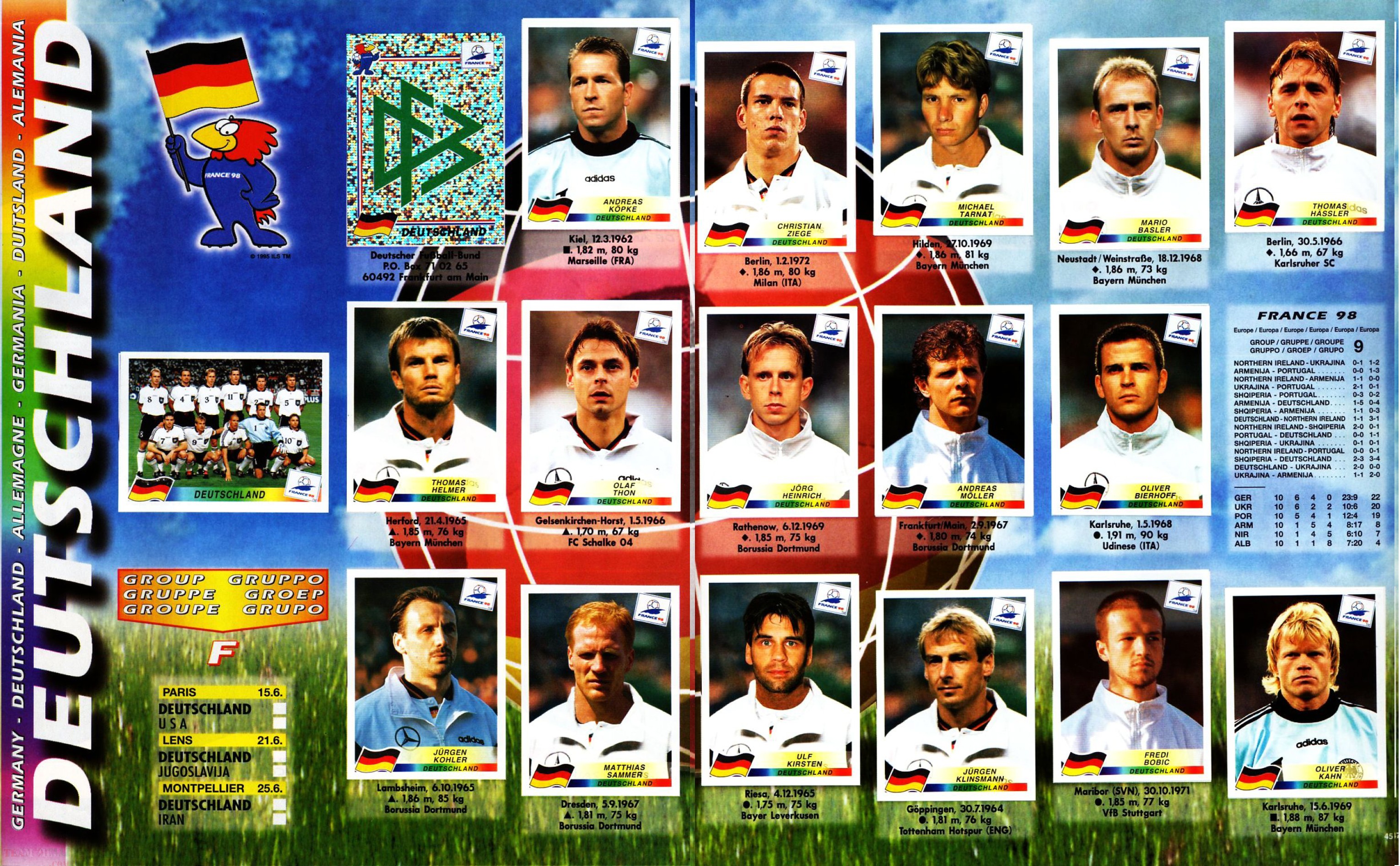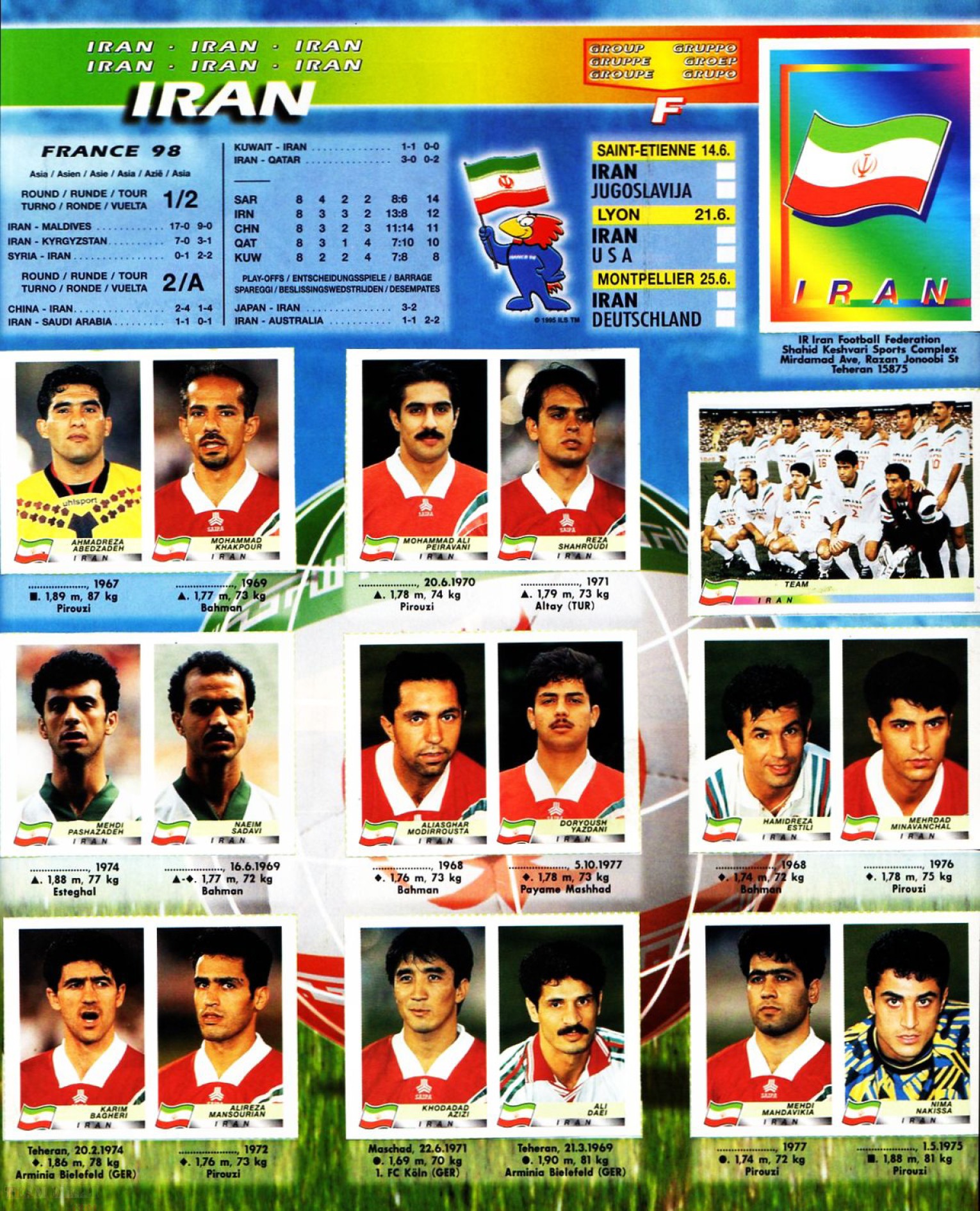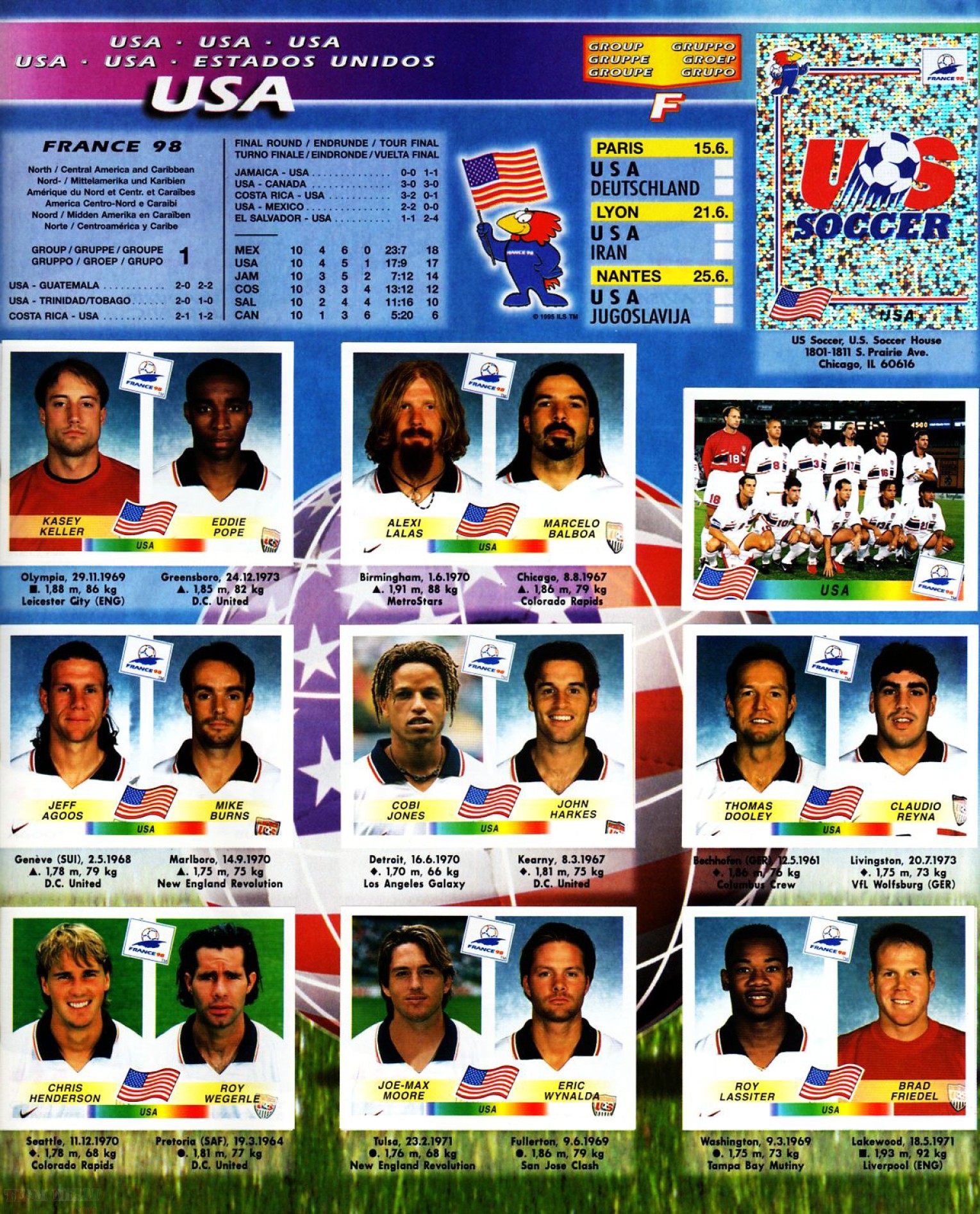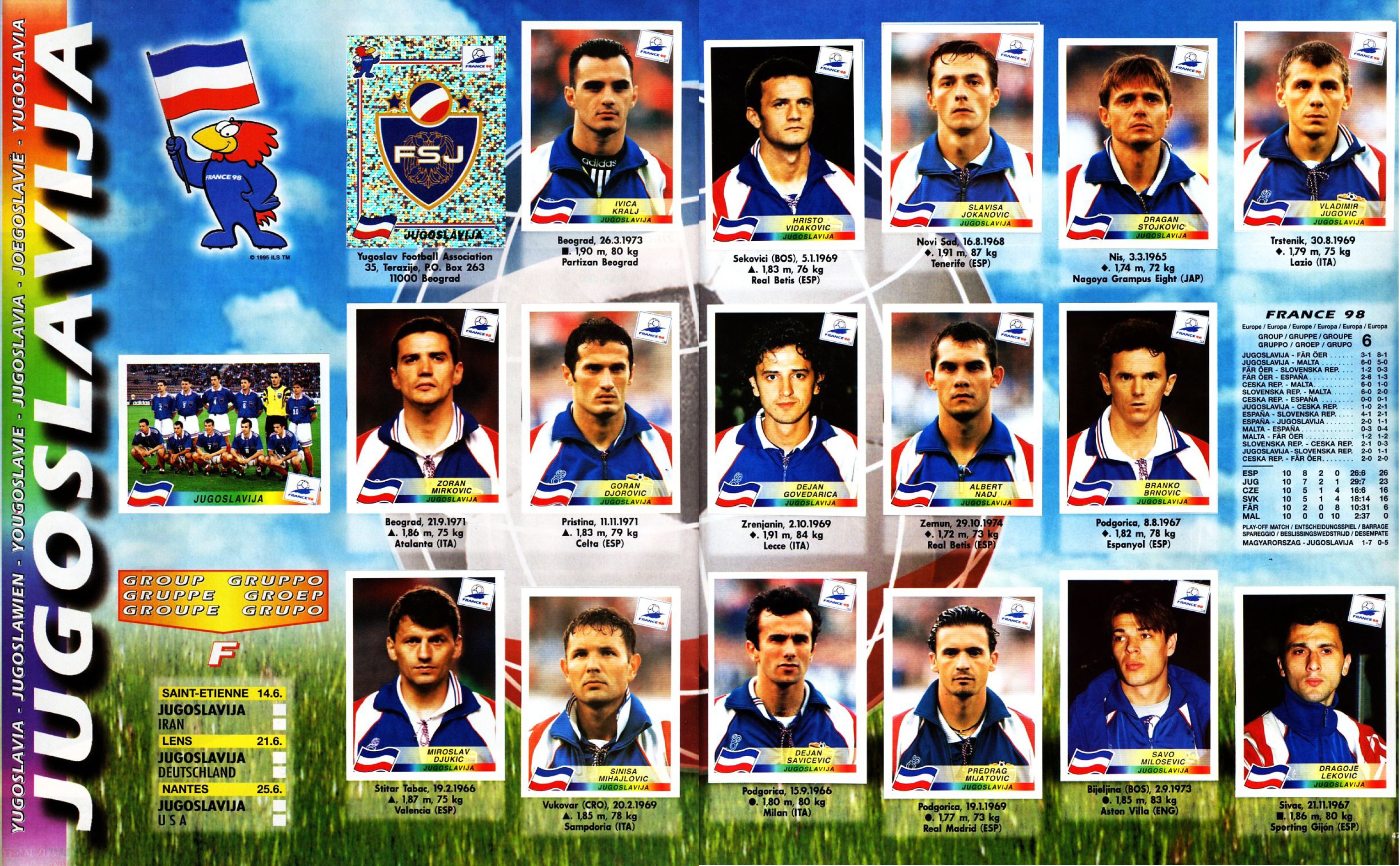[tabs]
[tab title=”Home”]
Iran road to qualification for the FIFA World Cup 1998 France was protracted, bumpy, dramatic and highly emotional. This was the most exciting campaign of Iran’s football in the history of any competition.
Never in the history of FIFA a team had to play 27 matches to qualify for the finals, Team Melli did it and the end result was something for the whole nation to be proud of and will remain in the memory and the history books for a long time.
Never in the modern history of Iran football the fans have seen so much emotion from the heartbreaking final minutes loss against Japan , to the excitement and joy of coming from two goals behind in Melbourne and virtually out of the World Cup , for the boys to score two goals , one by Karim BAGHERI and the decider by Khodadad AZIZI that took Iran to the World Cup.
a magnificent result that lead to millions of Iranians hitting the streets in joy.
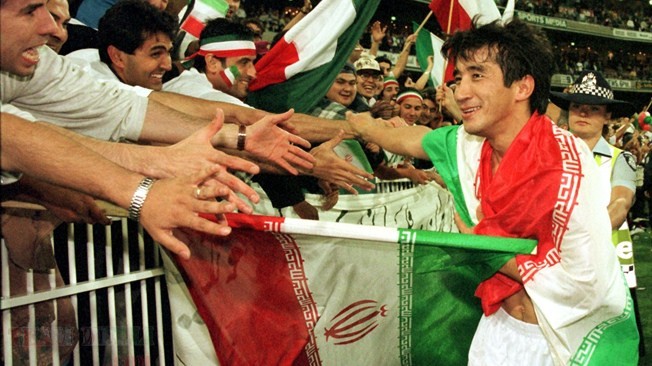
The team that entered the qualifications was basically the same team that played in the AFC Asian Cup 1996 in Emirates. In the aftermath of Iran’s very disappointing failure to qualify for the 1994 World Cup, the team went through a major re-building. A young coach called Mohammad Mayeli-Kohan was given the responsibility in 1996. The daring coach made major changes dispensing with older players and bringing a large contingent of younger talents, some of whom were unknown to many Iranian fans.
Mayeli-Kohan’s gamble was quite a success. Not only, Iran managed to stun the Asian football with some incredible results, including the destruction of the Asian Powerhouses South Korea with a 6-2 result and the eventual winner, Saudi Arabia 3-0 in the group stages, the exciting football the team played was a breath of fresh air in the competition. Team Melli attracted many admirers for the style of their football and the players’ individual skills. Unfortunately Iran’s luck ran out in the semifinals with a penalty shootout against the Saudi’s. Iran remained the only undefeated team in the AFC Asian Cup 1996.
The young team Mayeli-Kohan has built , would produce future world-renowned players in the caliber of Ali DAEI, Khodadad AZIZI, Karim BAGHERI and Mehdi MAHDAVIKIA all of whom player their football in Europe eventually.
The World Cup 1998 squad was essentially the backbone of the same team that won the third place in Asian Cup 1996.
The format set by FIFA for qualification to the finals in France was as follows
First Round: The 36 teams were divided into 10 groups of 3 or 4 teams each. The teams played against each other twice, except in Group 10, where the teams played against each other once. The group winners would advance to the Final Round.
Iran was placed in Group 2 alongside Syria, Kyrgyzstan , Maldives.
Final Round: The 10 teams were divided into 2 groups of 5 teams. The teams played against each other on a home-and-away basis. The group winners would qualify. The runners-up would advance to the AFC Play-off.
Play-off: The 2 teams played against each other once in Malaysia. The winner would qualify. The loser would advance to the AFC / OFC Intercontinental Play-offs.
The campaign started very well with a World Cup record win when Team Melli defeated Maldives 17-0. The round ribbon format was staged in two parts. First round played in Damascus and the second in Tehran. Team Melli went through with little effort in the group 2 stages
In the Finals rounds of qualification, Iran was grouped with China, Saudi Arabia, Kuwait and Qatar. Team Melli continued its exciting performance by defeating China away with a final score of 4-2. Team Melli was two goals behind, before Karim BAGHERI scored a penalty and then Mehdi MAHDAVIKIA folled with two stunning goals , one from a long-range. While the Chinese players were still trying to recover from the shock , Ali Asghar MODIR ROUSTA scored a fourth to strike the final nail in the coffin.
[/tab]
[tab title=”Qualifications Round”]
Creat
[/tab]
[tab title=”Squad”]
Team Melli Squad
World Cup 1998 France
| No. | ||
|---|---|---|
| 4 | BAGHERI, Karim20-Feb-74 24 years Arminia Bielefeld (GER) Midfield 44 Caps | 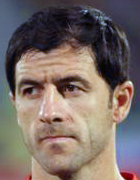 |
| 9 | ESTILI, Hamidreza01 -Apr-67 31 years Bahman Midfield 44 Caps | 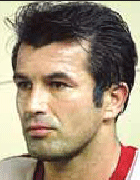 |
| 11 | AZIZI, Khodadad22-Jun-71 26 years Arminia Bielefeld (GER) Forward 27 Caps | 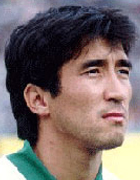 |
| 12 | MAHDAVIKIA, Mehdi24-Jul-77 20 years Persepolis Midfield 24 Caps | 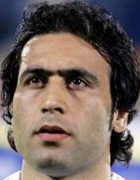 |
| 25 | MINAVAND, Mehrdad30-Nov-75 22 years Persepolis Midfield 23 Caps | 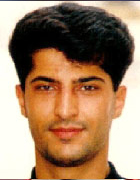 |
| 10 | DAEI, Ali21-Mar-69 29 years Arminia Bielefeld (GER) Forward 50 Caps | 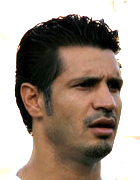 |
| 1 | ABEDAZDEH, Ahmadreza25-May-66 32 Years Persepolis Goalkeeper 66 Caps | 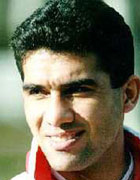 |
| 2 | SAADAVI, Naim16-Jun-69 28 years Perspolis Defender 8 Caps | 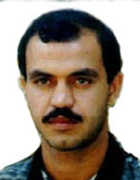 |
| 3 | OSTADASADI, Ali Akbar17-Sep-65 32 years Zob Ahan Defender 29 Caps | 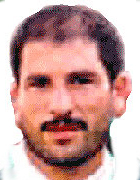 |
| 5 | PEYROVANI, Afshin6-Feb-70 28 years Persepolis Defender 37 Caps | 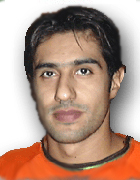 |
| 6 | DEENMOHAMMADI, Sirous2-Jul-70 27 years Shahrdari Tabriz Midfield 16 Caps | 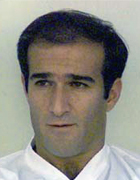 |
| 7 | MANSOURIAN, Alireza12-Dec-71 26 years Esteghlal Midfield 33 Caps | 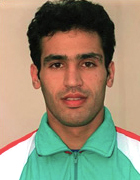 |
| 14 | KHAKPOUR, Mohammad20-Feb-69 29 years Bahman Defender 37 Caps | 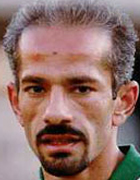 |
| 22 | NAKISA, Nima1-May-75 23 years Persepolis Goalkeeper 6 Caps | 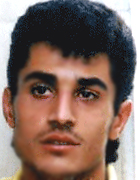 |
| 24 | LATIFI , Ali20-Feb-76 22 Years Bahman Forward 0 Caps | 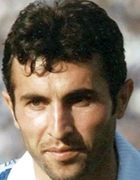 |
MOHAMMADKHANI, Nader23-Aug-63 34 Years Polyacryl Defender 16 Caps |  |
|
SHAHROUDI, Reza21-Feb-72 26 Years Persepolis Midfield 34 Caps | 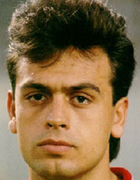 |
|
ZARRINCHEH , Javad23-Jul-66 31 Years Esteghlal Defender 55 Caps |  |
|
HAMEDANI, Sattar06-06-74 24 Years Bahman Midfield 3 Caps | 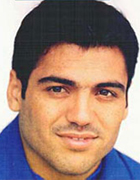 |
|
SERAJ , Behnam19-Jun-71 26 Years Sanat Naft Forward 0 Caps | 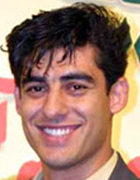 |
|
PASHAZADEH , Mehdi27-Dec-73 24 Years Esteghlal Defender 4 Caps | 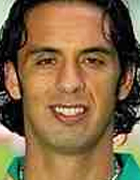 |
|
BOROUMAND, Parviz11-Sep-72 25 Years Esteghlal Goalkeeper 0 Caps |  |
[divider]
| # | Name | Caps | Goals | Birth Date | Age | Club |
| 1 | ABEDZADEH, Ahmadreza | 79 | 0 | 25-May-66 | 32 | Perspolis |
| 22 | BOROUMAND, Parviz | 19 | 0 | 02-Aug-75 | 23 | Esteghlal |
| 12 | NAKISA, Nima | 11 | 0 | 01-May-75 | 23 | Perspolis |
| 4 | KHAKPOUR, Mohammad | 52 | 2 | 20-Feb-69 | 29 | Bahman |
| 21 | MINAVAND, Mehrdad | 68 | 4 | 30-Nov-75 | 23 | Perspolis |
| 14 | MOHAMMADKHANI, Nader | 64 | 4 | 23-Aug-63 | 35 | Poli-Ekril Isfahan |
| 15 | OSTADASADI, Ali Akbar | 17-Sep-65 | 33 | Zob Ahan | ||
| 7 | PASHAZADEH, Mehdi | 12 | 0 | 27-Dec-73 | 25 | Esteghlal |
| 5 | PEYROVANI, Afshin | 69 | 0 | 06-Feb-70 | 28 | Perspolis |
| 3 | SAADAVI, Naim | 20 | 1 | 16-Jun-69 | 29 | Bahman |
| 16 | SHAHROUDI, Reza | 40 | 5 | 23-Mar-72 | 26 | Altay Izmir |
| 17 | ZARRINCHEH, Javad | 80 | 1 | 23-Jul-66 | 32 | Esteghlal |
| 6 | BAGHERI, Karim | 86 | 51 | 20-Feb-74 | 24 | Arminia Bielefeld |
| 8 | DEENMOHAMMADI, Sirous | 43 | 6 | 07-Oct-70 | 28 | Shahrdari Tabriz |
| 9 | ESTILI, Hamidreza | 82 | 12 | 04-Jan-68 | 30 | Bahman |
| 18 | HAMEDANI, Sattar | 38 | 1 | 16-Mar-73 | 25 | Bahman |
| 2 | MAHDAVIKIA, Mehdi | 108 | 13 | 24-Jul-77 | 21 | Perspolis |
| 7 | MANSOURIAN, Alireza | 46 | 7 | 02-Dec-71 | 27 | Esteghlal |
| 11 | AZIZI, Khodadad | 47 | 11 | 22-Jun-71 | 27 | FC Cologne |
| 10 | DAEI, Ali | 151 | 110 | 21-Mar-69 | 29 | Arminia Bielefeld |
| 13 | LATIFI, Ali | 2 | 0 | 20-Feb-76 | 22 | Perspolis |
| 19 | SERAJ, Behnam | 2 | 0 | 19-Jun-71 | 27 | Sanat Naft Abadan |
[/tab]
[tab title=”Group ‘F'”]
[tab/]
[/tab]
[tab title=”Matches”]
| 14.06.1998 at 17:30 Stade Geoffroy Guichar , Saint-Etienne | Attendance: 30392 |
|
1 – 0 |
|
| Referee: NORIEGA, Alberto – Peru | FIFA World Cup / Group F-match |
| Goalscorers |
| MIHAJLOVIC Sinisa (72′) | None. |
| Opening squads |
| KRALJ Ivica (GK) MIRKOVIC Zoran DJOROVIC Goran JOKANOVIC Slavisa BRNOVIC Branko MIJATOVIC Predrag JUGOVIC Vladimir STOJKOVIC Dragan MIHAJLOVIC Sinisa PETROVIC Zeljko MILOSEVIC Savo |
Nima NAKISA Javad ZARRINCHEH Mohammad KHAKPOUR Mehdi PASHAZADEH Nader MOHAMMADKHANI Mehrdad MINAVAND Mehdi MAHDAVIKIA Karim BAGHERI Hamidreza ESTILI Ali DAEI Khodadad AZIZI |
| Substitutes |
| STANKOVIC Dejan OGNJENOVIC Perica KOVACEVIC Darko |
Ahmadreza ABEDZADEH Naim SAADAVI Afshin PEYROVANI Alireza MANSOURIAN Sirous DEENMOHAMMADI |
| Substitutions |
| STANKOVIC Dejan -> BRNOVIC Branko 50′ OGNJENOVIC Perica -> MILOSEVIC Savo 58′ KOVACEVIC Darko -> STOJKOVIC Dragan 68′ |
Alireza MANSOURIAN -> Hamidreza ESTILI (68) |
| Yellow cards |
| PETROVIC Zeljko 42′ STOJKOVIC Dragan 60′ |
None. |
| Red cards |
| None | None. |
Match report
[divider]
| 21.06.1998 at 21:00 Stade Gerland , Lyon | Attendance: 44000 |
|
1 – 2 |
|
| Referee: MEIER Urs – Switzerland | FIFA World Cup / Group F-match |
| Goalscorers |
| Brian McBRIDE (87) | Hamidreza ESTILI (40) Mehdi MAHDAVIKIA (84) |
| Opening squads |
| Kasey KELLER (GK ) Frankie HEJDUK Eddie POPE Thomas DOOLEY David REGIS Roy WEGERLE Joe-Max MOORE Tab RAMOS Brian McBRIDE Claudio REYNA Cobi JONES |
Ahmadreza ABEDZADEH Nader MOHAMMADKHANI Mohammad KHAKPOUR Javad ZARRINCHEH Mehrdad MINAVAND Mehdi PASHAZADEH Mehdi MAHDAVIKIA Karim BAGHERI Hamidreza ESTILI Ali DAEI Khodadad AZIZI |
| Substitutes |
| Predrag SRADOSAVLIGEVIC Ernie STEWART Brian MAISONNEUVE Eric WYNALDA Jeff AGOOS |
Nima NAKISA Afshin PEYROVANI Naim SAADAVI Sirous DEENMOHAMMADI Alireza MANSOURIAN |
| Substitutions |
| Predrag SRADOSAVLIGEVIC -> WEGERLE Roy (57) Ernie STEWART -> Tab RAMOS (57) Brian MAISONNEUVE -> Thomas DOOLEY (82) |
Alireza MANSOURIAN -> Khodadad AZIZI (73) Afshin PEYROVANI -> Nader MOHAMMADKHANI (74) Naim SAADAVI -> Javad ZARRINCHEH (77) |
| Yellow cards |
| David REGIS (18) | Mehrdad MINAVAND (8) Javad ZARRINCHEH (77) |
| Red cards |
| None | None. |
[divider]
| 26.06.1998 at 21:00 Stade de la Mosson , Montpellier | Attendance: 33500 |
|
2 – 0 |
|
| Referee: GONZALEZ CHAVEZ Epifanio – Paraguay | FIFA World Cup / Group F-match |
| Goalscorers |
| BIERHOFF Oliver (50′) KLINSMANN Jurgen (57′) |
None. |
| Opening squads |
| KOPKE Andreas (GK) WORNS Christian HEINRICH Jorg KOHLER Jurgen HELMER Thomas THON Olaf MATTHAUS Lothar HASSLER Thomas KLINSMANN Jurgen BIERHOFF Oliver TARNAT Michael |
Ahmadreza ABEDZADEH Mohammad KHAKPOUR Javad ZARRINCHEH Mehrdad MINAVAND Mehdi PASHAZADEH Nader MOHAMMADKHANI Mehdi MAHDAVIKIA Karim BAGHERI Hamidreza ESTILI Ali DAEI Khodadad AZIZI |
| Substitutes |
| HAMANN Dietmar ZIEGE Christian KIRSTEN Ulf Oliver KAHN (GK) Jens JEREMIES Andreas MOELLER Stefan REUTER Markus BABBEL |
Nima NAKISA Afshin PEYROVANI Naim SAADAVI Ali Akbar OSTADASADI Sattar HAMEDANI Alireza MANSOURIAN Reza SHAHROUDI Sirous DEENMOHAMMADI |
| Substitutions |
| HAMANN Dietmar -> THON Olaf 46′ KIRSTEN Ulf -> HASSLER Thomas 69′ ZIEGE Christian -> TARNAT Michael 76′ |
Sirous DEENMOHAMMADI -> Javad ZARRINCHEH (70) |
| Yellow cards |
| HASSLER Thomas 46′ KLINSMANN Jurgen 31′ |
Ali DAEI (47) |
| Red cards |
| None | None. |
| Match report |
[/tab]
[tab title=”Articles”]
[spoiler title=”Iran Gives Its Heart To Soccer-Apr 1998″]World Cup Berth Excites Nation
April 22, 1998|By Philip Hersh, Tribune Staff Writer.
TEHRAN — Seyed Sadati, who is in the import business, brought a television from home to the bank offices where he was working last Nov. 29. Business would not stop him from watching the soccer match between the national teams of Iran and Australia that was to become more than a game. It was an event of immense significance to Iranians, especially those of Sadati’s generation. Almost miraculously, Iran rallied from a two-goal deficit in the final 20 minutes for the 2-2 tie in Melbourne that gave the Iranians a place in the World Cup finals for the first time since 1978.
As soon as the match ended, Sadati ran into the streets to join millions of his countrymen–and, more notably, countrywomen–dancing and singing in what would be the start of a four-day celebration. Those first, intense moments of postmatch elation seemed so recent as Sadati, 35, was discussing them three days ago in the lobby of the Laleh Hotel. He, his wife and their 6-year-old son almost were reliving them as they took part in another mob scene, created by the fans swarming for autographs and pictures with the Iranian national team players, who are staying at the hotel during this week’s LG Cup tournament in Tehran. Between taking and making calls on their latest model cellular phones, the players willingly soaked up the adulation. It was heightened by anticipation of Monday’s match with Hungary, the team’s first competition in the Iranian capital since the triumphal tie in Australia. “In the past 20 years, I have never seen all Iranians smiling and so happy and so unified as we were immediately after that Australia match,” Sadati said.
“To me it was a second revolution.” From the euphoria also have come expressions of prideful nationalism that, filtered through soccer, do not threaten countries who fear that Iran’s national agenda still includes support for terrorism. At the same time, that pride buoys the spirits of a country that has known little but war and economic distress for the two decades since its last World Cup participation. “Maybe the government thinks it is good for political reasons to have our flag raised and our anthem played,” said Siavash Amir-Shahi, a Tehran industrial zone manager. “But to the players it is important for our honor and their future. When you are poor economically, you need other things to be honored, and soccer is one of those things.” The insistence of other Iranian women in joining the celebration after the Australia match, in the streets and among a crowd of 70,000 who greeted the returning team at 120,000-seat Azadi Stadium three days later, was a very visible step in the arduous climb toward expanded women’s opportunities in the Islamic fundamentalist nation.
Amir-Shahi’s wife, Taraneh Amir-Soleimani, and their two daughters, Tannaz and Afsoun, broke into tears in their Tehran apartment when the World Cup berth was clinched. Then Taraneh’s mother came down from her apartment to join them in crying. Sadati’s wife, Parvin, discovered that, “all of a sudden, soccer had become part of my daily life.” Three women dressed in the traditional chador, a black cloak covering the body from head to ankles, came to the Laleh last week to give heartthrob goalie and team captain Ahmadreza Abedzadeh a bouquet of red roses. Fundamentalist strictures kept women from attending the national team’s matches in the LG Cup, which also included Jamaica and Macedonia. Iranian women are not supposed to see men play in shorts, but admission was granted Monday to female reporters for the first time, to some Macedonian flight attendants and to several Iranian girls under 9 years old. That is the age when they must begin to wear the hejab, which includes a head covering and shapeless cloak to hide any part of the female form that might attract or distract a man. “Yes, not being able to go is disappointing,” said Sadati’s wife, with the unmistakable longing of someone who wanted to be at Monday’s 2-0 loss to Hungary. Female fandom is so widespread and intense it has led to new discussions about the issue of women’s presence at men’s matches. The presence of Iran in the world’s most popular sporting event, the quadrennial soccer World Cup, gives the country a major place on an international stage for the first time since the political, religious and social revolution led by Ayatollah Ruhollah Khomeini overthrew the Shah in 1979. It allows Iranians the chance to attract attention as sportsmen and sports fans instead of as outlaws, terrorists and religious fanatics, which remains the perception widely held in much of the West. “We want to say, `We are not what you think about us,’ ” midfielder Alireza Mansoorian said. “The negative propaganda you have heard about Iran is not true. We are true human beings [/spoiler]
[spoiler title=”World Cup bound Iran ousts coach – May 1998”]World Cup-bound Iran Ousts Soccer Coach May 21, 1998|By Philip Hersh. Tomaslav Ivic happily was signing autographs and posing for pictures with Iranian soccer fans in a Tehran hotel lobby a month ago. The memento-seekers, ecstatic about having their team about to play in the World Cup for the first time in 20 years, did not seem to care that Ivic’s status already was being hotly contested. “They love their team, and I also belong to their team,” said Ivic, the Croatian who was hired as head coach in January. “So they say, `Mr. Ivic, we love you too.’ “I know that if you make bad results, it will be difficult. If you make some success, you will stay in their hearts.”
Tuesday’s result, a 7-1 loss to a mostly second-string lineup of Italian first division club AS Roma, was so bad it brought an end to Ivic’s brief relationship with the Iranian national team. The switch was made less than a month before Iran opens World Cup play against Yugoslavia (June 14). Its other first-round opponents are the United States (June 21) and Germany (June 25). The Islamic Republic News Agency announced Wednesday that Ivic had been fired and replaced by Jalal Talebi, an Iranian. Talebi, who coached the Indonesian 23 & under team last year, had been made a technical adviser to the Iranian national team April 29. The romance between Ivic and Iran’s fans had, from the beginning, been like a familiar pop song lyric: “If you can’t be with the one you love, love the one you’re with.” That was apparent April 20, when Iran met Hungary in its first match in Tehran since qualifying for the World Cup last November.
As soon as Hungary scored its first goal in a 2-0 win, the crowd of 70,000 began chanting, “Vieira, Vieira.” They were calling for the return of their true love, Valdeir Vieira, the Brazilian who had been the coach at the moment of qualification. Although Vieira had coached the team in only three matches–a loss to Japan and two ties with Australia–he captured the fancy of a soccer-mad Iranian public that fancied its team as exponents of the Brazilian style.
Political pawn: Ivic was unpopular with the Iranian public from the moment he was hired. Some resentment came from his emphasis on defense, but most owed to the perception that politics led to his hiring. The success of the soccer team gave the Iranian public, both men and women, a chance to express itself as a mass without any fear of government backlash. Then conservatives in the government feared the “soccer freedom” movement would go too far, so they forced the president of the Iranian soccer federation, Dariush Mostafavi, to resign not long after he had pushed for the federation’s independence from government interference.
HashemiTaba, Iran’s sports minister but a man with no sports background, replaced Mostafavi in December with a political appointee, MoshenFarahani–the 15th different federation president since 1979. Farahani hired Ivic, even though the federation still had a contract with Vieira. The Iranian people didn’t dislike Ivic as much as those who hired him. Their discontent with the coach grew as his team managed just three wins and a tie in the first nine matches under Ivic. It was twice beaten by mediocre French club teams. The loss to AS Roma, which finished fourth in the Italian first division, did have one bright spot. Top offensive threat Ali Daei, feared lost for the World Cup after sustaining a broken jaw May 2, not only is back in action but also scored Iran’s lone goal. [/spoiler]
[spoiler title=”Edgy Yugoslavs scrape past the resilient Iranians; YUGOSLAVIA 1 IRAN 0.-Jun 1998″]
World Cup dark horses Yugoslavia were looking non-runners for France 98 until Sinisa Mihajlovic’s late free kick secured an edgy victory over Iran in Saint Etienne yesterday.
Despite 41 goals during qualifying, the Yugoslavs struggled to exploit their dominance of possession until the 73rd minute as Iran frustrated their ambitions.
Yugoslav coach Slobodan Santrac even resorted to pulling off his captain and chief playmaker Dragan Stojkovic four minutes before the goal such was his team’s failure to beat a resilient backline.
This is Yugoslavia’s ninth World Cup appearance, but their first since the FIFA ban in the wake of civil war just 11 days before the start of Euro 92 not lifted until after USA 94.
On the eve of yesterday’s match, it emerged there have been calls from several political quarters for expulsion again, but FIFA insist they will only be guided by UN instructions.
As for Iran, Jalal Talebi is the fourth coach within the past year with both Valdeir Vieira and Tomislav Ivic dismissed since qualification was achieved against Terry Venables’ Australia.
But his job security should have been enhanced by a confident display from his team ranked 500-1 outsiders to win this competition outright.
Savo Milosevic, the former Aston Villa forward, missed the first clear opening for Yugoslavia meeting Zeljko Petrovic’s swinging cross with a weak header after five minutes.
A Stojkovic corner set up Goran Djorovic for a looping 15th-minute header which clipped the top of the crossbar before the rebound was cleared to safety.
The Yugoslavs were controlling the early possession, but after 23 minutes a careless pass by Petrovic released Iran’s Karim Bagheri to spark a flowing move.
Khodadad Azizi made progress down the right and his cross fell to Mehdi Mahdavikia on the edge of the area whose low powerful drive needed a smart stop by keeper Ivica Kralj.
Another curling Stojkovic corner on the halour mark for Yugoslavia picked out Tenerife midfielder Slavisa Jokanovic at the near post, but his glancing header drifted over.
Five minutes later, Milosevic was again to the fore, cutting inside well before firing a 20-yard effort just the wrong side of the upright.
Yet Iran were quick to break and after 37 minutes Azizi exchanged passes with Mohammad Khakpour who fed Mehrdad Minavand Chal, but he snatched at the close-range chance when wellaced.
Goalless at the interval, Yugoslavian coach Santrac made a switch soon after the restart introducing one-time Rangers target, now bound for Lazio, 19-year-old Dejan Stankovic.
The ineffectual Milosevic was replaced in attack after 58 minutes with Perica Ognjenovic able to offer better support to the surprisingly quiet Predrag Mijatovic.
After 65 minutes, Yugoslavia spurned a free kick for handball against Bagheri, Mihajlovic’s effort comfortably gathered by Nima Nakisa in the Iran goal.
Skipper Stojkovic, booked on the hour, paid the price for his side’s below-par showing by being himself withdrawn for Darko Kovacevic after 69 minutes.
Four minutes later, the deadlock was at last broken, Bagheri conceding another dangerous free kick and this time the Iran defender was punished.
Sampdoria’s Mihajlovic curled the ball round a defensive wall and his strike defeated the diving Nakisa to put Yugoslavia ahead.
Iran still refused to be overawed however, Mahdavikia’s 81st-minute shot needing an alert block by Djorovic to prevent a swift comeback.
In an all too rare glimpse of his talent, Real Madrid forward Mijatovic rifled an angled drive which was beaten away superbly by Nakisa after 83 minutes.
With four minutes remaining, Ali Daei’s fierce header troubled Yugoslav keeper Kralj who initially fumbled, but he, much like his side, held on in the end.
Scorer: Mihajlovic (73) 1-0.
YUGOSLAVIA: Kralj, Mirkovic, Djorovic, Jokanovic, Mihajlovic, Brnovic (Stankovic, 51), Jugovic, Petrovic, Mijatovic, Stojkovic (Kovacevic, 69), Milosevic (Ognjenovic, 59).
IRAN: Nakissa, Khakpour, Zarincheh, Paschazadeh, Mohammadkhani, Estili (Mansourian, 69), Mahdavikia, Minavand, Bagheri, Azizi, Dai.
Referee: A Tejada Noriega (Peru).
Bookings: Yugoslavia – Petrovic, Stojkovic.
Attendance: 30,392.[/spoiler]
[/tab]
[/tabs]

